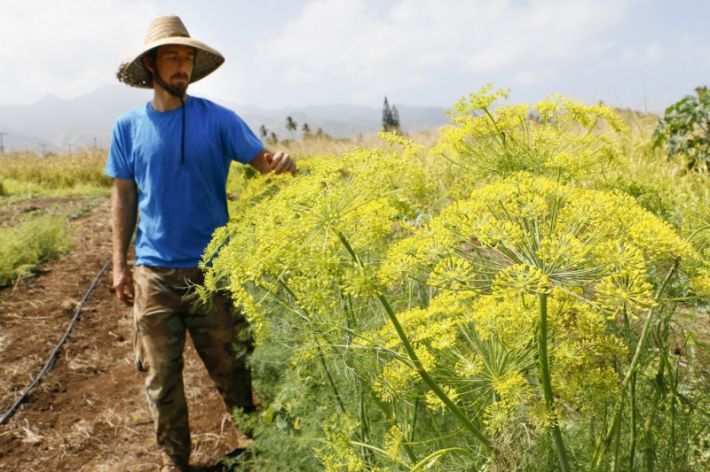Eight semi-finalists have been selected in the 2016 Mahiʻai Match-Up agricultural business plan contest dedicated to supporting Hawaiʻi’s sustainable food movement by cultivating local farmers and decreasing the state’s dependence on imports.
The contest is sponsored by Kamehameha Schools (KS), the Pauahi Foundation, Ulupono Initiative, “Hawaiʻi Farm and Food” Magazine and Hiʻilei Aloha.
“Mahiʻai Match-Up provides a venue for farmers and entrepreneurs to access some of our most valuable agricultural lands,” said Sydney Keliʻipuleʻole, senior director of statewide operations for Kamehameha Schools.
“The goal of Mahiʻai Match-Up directly aligns with our Agriculture Plan to help make Hawaiʻi more self-sufficient by increasing local food production. The group of entrants from the first two years has been impressive, and we are excited to see what year three has in store.”
The contest also aligns with goal 3 of KS’ Strategic Plan, Kūhanauna by working to integrate education with culture, agriculture and sustainability.
Over the past three years, Mahiʻai Match-Up has received over 200 applications from farmers, ranchers and agricultural entrepreneurs from across the pae ʻāina (island chain). All applications are reviewed by a screening committee, and only a select number of teams advance to the next round. Semi-finalists chosen have until May 23 to submit their completed business plans.
In July, the top two finalists will have a chance to present their plans in front of the judging panel. Judges this year include Kāʻeo Duarte, vice president of Community Engagement & Resources for Kamehameha Schools; Kyle Datta, general partner for Ulupono Initiative; Martha Cheng, editor for Hawaiʻi Farm and Food Magazine; Martha Ross, capacity-building manager for Hiʻilei Aloha; and Mark “Gooch” Noguchi, executive chef for Pili Group.
Both finalists will receive an agricultural land agreement with up to five years of waived rent from Kamehameha Schools. This year’s Mahiʻai Match-Up land parcels are in Punaluʻu on Oʻahu and in Pāhoehoe on the Hāmākua Coast of Hawai‘i island. Based on the quality of both the business plans and presentations, seed monies from the Pauahi Foundation will be awarded in the amounts of $20,000 and $15,000 for first and second place. Seed monies awarded help to make these winning business plans a reality and increase the probability of long-term, sustainable success.
The winners will be announced at the Mahiʻai Match-Up Gala on July 30. Proceeds from the event go towards agricultural scholarships and grants. Anyone interested in attending the Gala or becoming a sponsor can get more information by visiting the Mahiʻai Match-Up website.
PAST MAHIʻAI MMATCH-UP WINNERS
Holoholo General Store
First place, 2014. Land parcel: Paʻalaʻa on Oahu’s North Shore. Holoholo General Store started their business with Community Supported Agriculture (CSA), offering fresh produce and specialty items delivered directly to customers.
Now they are partnering with Twin Bridge Farms to provide local, fresh and delicious grab-and-go foods. The “Red Barn Farmstand” is scheduled to open in May on Cane Haul Road in Haleʻiwa and will include cooking classes, farm tours, and workshops showcasing local farms and artisans.
Kaunamanō Farm
Second place winner, 2014. Land parcel: Umauma on Hawaiʻi island’s Hāmākua coast. Kaunamanō Farm produces organic Berkshire pork, goat cheeses and eggs utilizing traditional Japanese methods.
Currently the farm is working on increasing production of feed crops such as papaya, banana and moringa to reduce and eventually eliminate use of off-site food sources. The goal is to create “an island within an island,” so that the farm can truly be self-sustainable.
Mapulehu Farm
Third place winner, 2014. Land parcel: Kaunakakai, Molokaʻi. The organic mango orchard will partner with educational programs teaching the community about Hawaiian-based farming practices.
Mala Kalaʻulu
First place winner, 2015. Land parcel: South Kona. This business is engaged in holistic agricultural production, research and education. The team completed phase one of its land development plan to cultivate ‘ulu (breadfruit) and ‘olena (turmeric) among other fruit crops on their farm.
Counter Culture Foods (CCF)
Second place winner, 2015. Land parcel: Oahu’s North Shore. CCR is a seed-to-countertop fermented foods producer offering raw, probiotic kimchi and tempeh as their primary products.
You can find CCF at the Waimea Valley and Pearlridge Farmers Markets, and also at their co-op's shared market booths in Kaka‘ako and Kailua.
Want to find out more about these farms?
To join the CSA or learn more about the “Red Barn Farmstand” visit: www.holoholostore.com
Follow Brandon and his farming adventures on Instagram @kaunamanofarm Find Counter Culture Food products at these farmer’s market locations: Waimea Valley - Thursday, 2-6 p.m. Pearlridge - Saturday, 8 a.m.-Noon Kaka‘ako - Saturday, 8 a.m.-Noon Kailua - Sunday, 8:30 a.m.-12 p.m.

Since winning the contest, you can find Counter Culture Foods at a variety of farmers markets. Proprietor Rob Barreca offers raw, probiotic kimchi and tempeh as their primary products.

Brandon Lee with Kaunamanō Farm uses a method of rotational farming with no waste or foul odors normally associated with raising hogs.
Related photo galleries
TAGS
community engagement and resources,
ce&r,
strategic plan,
agriculture,
sp2020
CATEGORIES
Kaipuolono Article, Newsroom
Print with photos
Print text only










